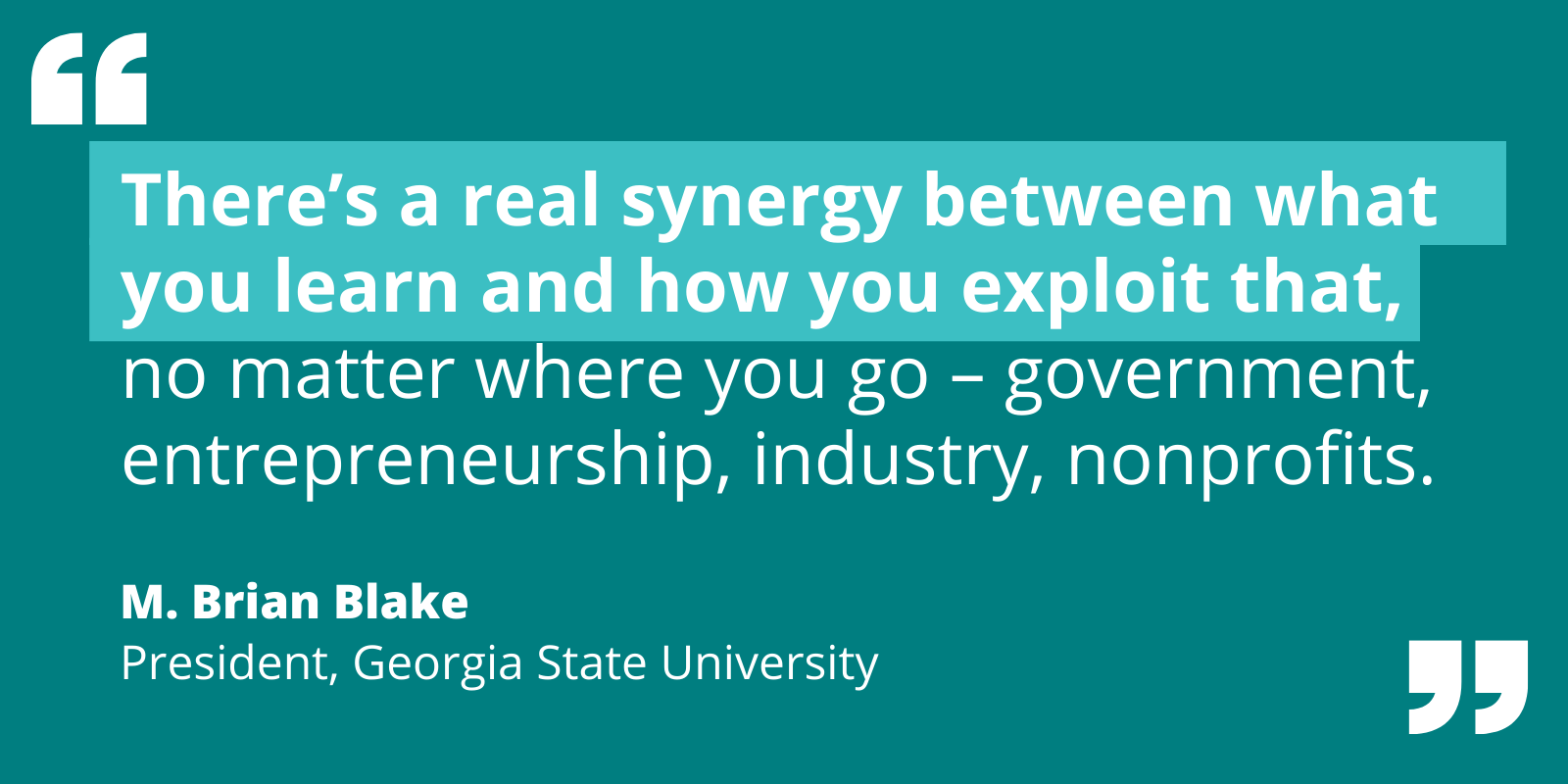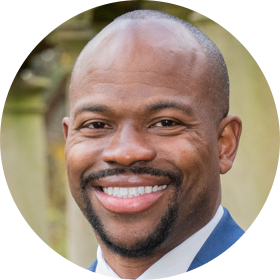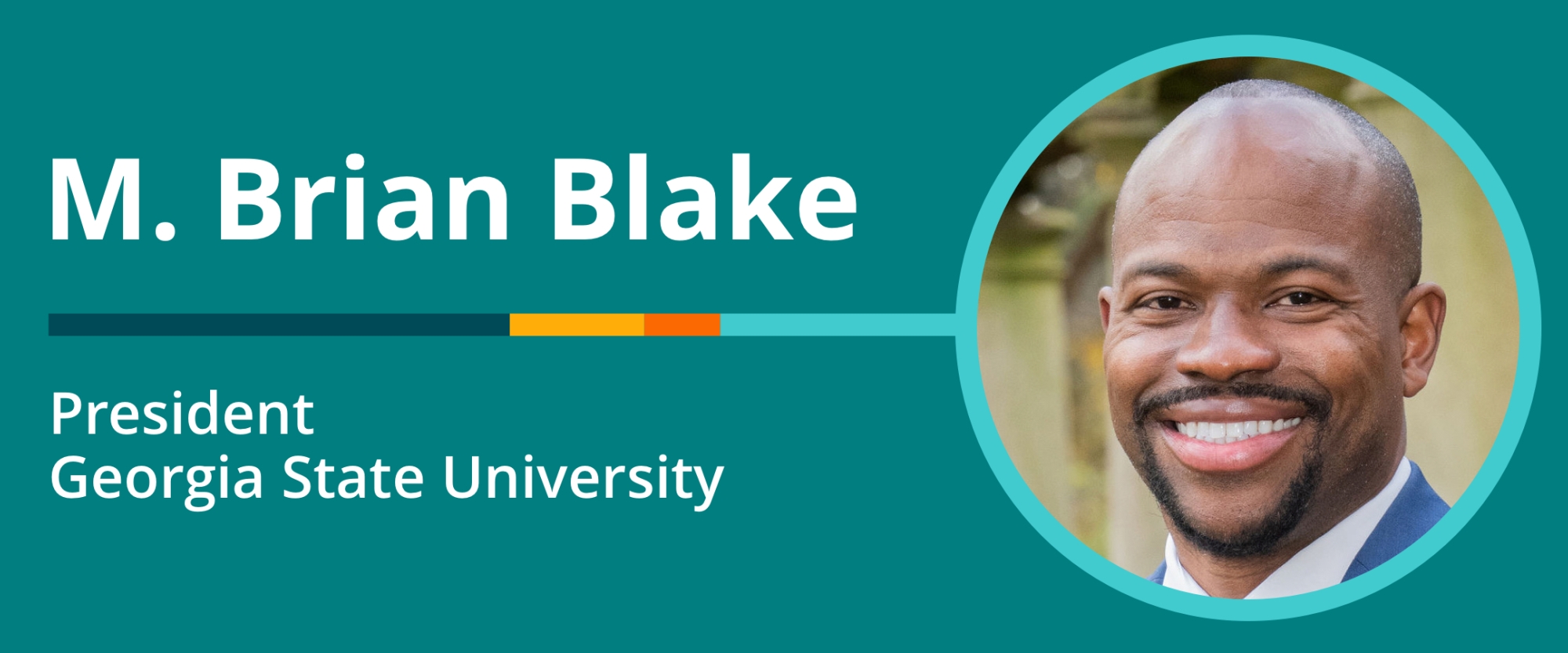We spoke with M. Brian Blake on the Weekly Wisdom Podcast as he approached his one-year anniversary of becoming President at Georgia State University. Since he began his distinguished academic career after transitioning from the private sector, we were eager to hear his wisdom about how it affected his approach to academic leadership, the guidance and opportunities that he's offering his students, and the perceptions and expectations around a job well done.
Similarities Between Industry and Academia
President Blake's journey to his current position at Georgia State has been a bit different from those of many other academic leaders. From a childhood of pumping gas and bookkeeping for the family business to a career in software engineering, he developed a strong entrepreneurial spirit.
"When you work in industry," he explained, "deadlines and critical path and quality and deliverables, all those things are a part of your job in such a way that you really emphasize them. So by the time I got into this perspective of being in academia, that piece was part of how I operated. But I thought it was a great synergy. That perspective was a real kick-start to my academic life."
President Blake dismisses the common misconception that there is no middle ground between academic and corporate mindsets.
"We’re scholars," he reminded us. "We’re taught to specialize – almost in verticals. I’m a software engineer by training, so we’re taught to do large software applications by bringing together smaller parts and then also allowing large groups of people to work at the same time. My favorite term is 'a thousand flowers blooming,' because what you can do in academia which works out really well is that you can literally start a lot of things going. You have a lot of really smart people on campus, so you can set these task forces and different working groups together. And if you’re smart enough to choreograph them in such a way that the deliverables, when the timing’s right, you can really make significant impact, and then also thinking through that and attaching it to a vision that the community agrees to."
The Path From College to Careers
President Blake has proposed a four-pillar strategy for the shared aspirations of Georgia State: research and innovation; student success; college to careers; and identity and placemaking. We asked him how the college-to-careers pillar might have drawn on the unique vantage point of his software engineering background.
"There’s a real great synergy between what you learn and how you exploit that, no matter where you go," he said, "in government, entrepreneurship, industry, or even nonprofits. It seems like a software engineer is a foundation of thought. I just think we should address and engage our students really early. We have so many talented students that are coming in now. I just feel like we have to develop an ecosystem on our campus where we can partner with whatever those outcomes may be, whether it’s graduate school or industry or government. Recruit the students from day one, and then try to weave their path such that they go directly into those opportunities. Very similar to software engineering. Some of that’s baked in, but other paths we could probably put in some specific modules or credentials that allow our students to have an immediate impact, whatever the outcome may be.

"So my college-to-careers pillar is all about creating that ecosystem here. The first phase is probably developing co-branded curriculum, facilities so that industry can share their problems, and maybe we get some industry or government officials to teach, and then we create those bridge modules. And then over time, we build up relationships that allow us to engage students from the time they graduate from high school or earlier."
Adding the Human Element
Just about everyone can point to surprises along their career path, and President Blake shared his.
"I don’t think anyone ever quite fully understands what input leads to what output," he began. "You’ve got a left side and a right side of an equation. Your tendency is to say, 'I can engineer the right side to get to the left side.' It’s going to be very deterministic. I didn’t appreciate the influence and perspective and encouragement of building a team and team dynamics. If you were to ask me this five, ten years ago, I’d have said, 'We’ve just got to start the right programs and fund the right things.'"
Then he explained the X factor in that equation: "You smiled at the right person, or you hired the right person, or you promoted the right person, or you recruited the right student that came up with the right idea, and none of that is stuff that you do specifically. It’s just a matter of setting a framework, supporting, empowering, and being a certain leader. And then allowing your community to really shine. When I looked back and tried to map out how we got there, I found that the majority was more serendipitous than I would have thought. I’ve got to the point now where I understand you’ve got to build a community that feels just inspired, and they feel like they can be entrepreneurial. And then don’t say no as a first answer. Try to say, 'This is how we get to yes.'"
High Quality Deliverables
We often ask our guests to share the most valuable career advice they ever received. President Blake heard the same thing from two very different sources.
"One was during my time at The MITRE Corporation," he recalled. "It’s an FFRDC, so you are actually an agent of the government, a consultant to help them with their vendors, their contractors. A lot of your products are PowerPoint and thought pieces, and because that is the deliverable, everyone talks about quality. I mean your slides, how the pictures are formatted, what words you use. So it gets ingrained in you that when you deliver something, you always deliver in high quality because that’s your deliverable.
"And then I’ll talk about Peter Freeman, one of the first Deans of Computing at Georgia Tech. One time I spoke with him, I was considering job opportunities. And I gave him this long list hoping that he’d just say, 'Go to this one or that one.' And his response was, 'Just do everything at the highest quality you can.'"
President Blake has applied that advice ever since, adding, "Many of my opportunities today are because someone remembers something I did that was really high quality. So I always tell people, 'Just concentrate on quality. Everything else will fall in place.' You can’t always do things perfect. But if you can do it with as much thoughtfulness as you can before you let it go out the door, people always remember that."
For more comprehensive and specific advice about academic leadership, President Blake recommended the book Presidencies Derailed by his mentor Steve Trachtenberg, the former president of George Washington University:
"That was an excellent read, particularly coming into a presidency to see a couple of different perspectives on the role and get your feet wet. So I would say that’s not for everyone, although I think it transcends academia. But I would recommend that for academics who could imagine being a president at some point."
Note: This interview in the Weekly Wisdom Series originally aired on May 2, 2022 as part of the University Innovation Alliance’s Innovating Together Podcast, appearing live on Facebook, Twitter, and LinkedIn.
Links Mentioned in This Episode
• Weekly Wisdom Podcast
• Georgia State University
• Four-pillar strategy (President Blake's mission for his presidential tenure at Georgia State)
• The MITRE Corporation (a federally funded R&D enterprise developing tech solutions for the public good)
• FFRDC (Federally Funded Research and Development Center, such as The MITRE Corporation)
• Peter Freeman (Founding Dean and Dean Emeritus at Georgia Tech's College of Computing)
• Presidencies Derailed: Why University Leaders Fail and How to Prevent It by Stephen Joel Trachtenberg, Gerald B. Kauvar, and E. Grady Bogue
• Steve Trachtenberg (Stephen Joel Trachtenberg, former president of George Washington University and President Blake's mentor)
Bios of Guest and Co-Hosts

Guest: M. Brian Blake, President, Georgia State University
Dr. M. Brian Blake was appointed President of Georgia State University in June 2021. Prior to joining Georgia State, he was Executive Vice President for Academic Affairs and Provost at George Washington University, where he oversaw academic programs across the ten schools and colleges, three campuses, and 28,000 students. He led the university’s re-envisioned enrollment strategy to meet changing student demographics, as well as guiding GWU's academic programs through the COVID-19 pandemic. Before GWU, Dr. Blake served as Executive Vice President for Academic Affairs and Nina Henderson Provost at Drexel University, overseeing 14 schools and colleges and more than 25,000 students. His accomplishments there included developing an academically focused strategic vision entitled “Creating the 21st-Century Academic Experience,” hiring 11 deans and more than 100 faculty while increasing administrative diversity, and the creation of new programs and facilities. Prior to his time at Drexel, Dr. Blake served as Vice Provost for Academic Affairs and Dean of the Graduate School at the University of Miami, with oversight and advocacy of more than 155 programs across 12 schools and colleges composed of more than 5,700 students. He was the Associate Dean for Research & Graduate Studies and Professor of Computer Science and Engineering at the University of Notre Dame. Prior to his tenure at Notre Dame, he was Chair of the Department of Computer Science and its Director of Graduate Studies at Georgetown University. Throughout his career, Dr. Blake has served as adviser or co-adviser to 15 postdoctoral Fellows and graduate students and more than 30 undergraduate researchers. He has authored or co-authored more than 200 journal articles, books/book chapters, and refereed conference/workshop papers. He is best known for his contributions to the areas of adaptive, inter-organizational workflow for Web-based services and systems. Dr. Blake has served on five National Academies’ studies or committees and on the National Science Foundation’s Advisory Committee for the Computer and Information Science and Engineering Directorate.

Co-Host: Bridget Burns, CEO, University Innovation Alliance
Dr. Bridget Burns is the founder and CEO of the University Innovation Alliance (UIA). For the past decade, she has advised university presidents, system chancellors, and state and federal policy leaders on strategies to expand access to higher education, address costs, and promote completion for students of all backgrounds. The UIA was developed during Bridget’s tenure as an American Council on Education (A.C.E.) Fellowship at Arizona State University. She held multiple roles within the Oregon University System, including serving as Chief of Staff and Senior Policy Advisor, where she won the national award for innovation in higher education government relations. She was a National Associate for the National Center for Public Policy and Higher Education, and has served on several statewide governing boards including ones governing higher education institutions, financial aid policy, and policy areas impacting children and families.

Co-Host: Doug Lederman, Editor and Co-Founder, Inside Higher Ed
Doug Lederman is editor and co-founder of Inside Higher Ed. With Scott Jaschik, he leads the site's editorial operations, overseeing news content, opinion pieces, career advice, blogs and other features. Doug speaks widely about higher education, including on C-Span and National Public Radio and at meetings and on campuses around the country. His work has appeared in The New York Times and USA Today, among other publications. Doug was managing editor of The Chronicle of Higher Education from 1999 to 2003, after working at The Chronicle since 1986 in a variety of roles. He has won three National Awards for Education Reporting from the Education Writers Association, including one for a 2009 series of Inside Higher Ed articles on college rankings. He began his career as a news clerk at The New York Times. He grew up in Shaker Heights, Ohio, and graduated in 1984 from Princeton University. Doug and his wife, Kate Scharff, live in Bethesda, MD.
About Weekly Wisdom
Weekly Wisdom is an event series that happens live on Facebook, Twitter, and LinkedIn. It also becomes a podcast episode. Every week, we join forces with Inside Higher Ed and talk with a sitting college president or chancellor about how they're specifically navigating the challenges of this moment. These conversations will be filled with practicable things you can do right now by unpacking how and why college leaders are making decisions within higher education. Hopefully, these episodes will also leave you with a sense of optimism and a bit of inspiration.
Rate, Review & Subscribe
Learn why hundreds of people have rated this new podcast 5 stars! Please join others and rate and review this podcast. This helps us reach and inform more people -- like you -- to help increase the number and diversity of college graduates in the United States.
Click here, scroll to the bottom, tap to rate with five stars, and select “Write a Review.” Then be sure to let us know what you loved most about the episode! Also, if you haven’t done so already, subscribe to the podcast. We’ll be adding a bunch of bonus episodes to the feed and, if you’re not subscribed, there’s a good chance you’ll miss out.

